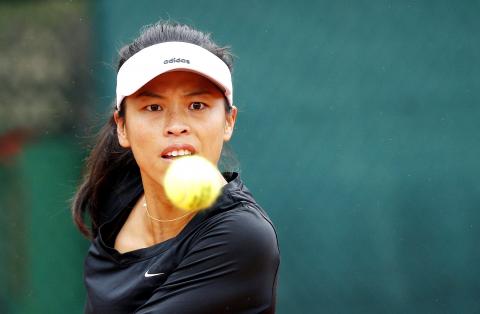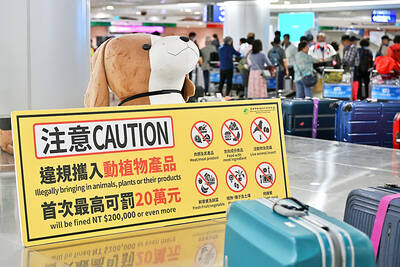Tennis player Hsieh Su-wei (謝淑薇) yesterday wrote on Facebook that she would retire from playing tennis for Taiwan and would never again accept a call-up from the national team, adding that she no longer wants to be a national tennis player forced to bear unfair treatment.
“I went to see Chinese Taipei Olympic Committee vice chairman Tsai Szu-chueh (蔡賜爵) today and wanted to talk about the problems with the system, but he pounded the table and yelled at me instead,” Hsieh wrote. “I don’t want to be a national team player who has to go through all this unfair treatment again. It is with great pain that I make this announcement.”
It was not the first time that Hsieh has criticized the committee and the Chinese Taipei Tennis Association over what she sees as her unfair treatment.

Photo: EPA
In June, Hsieh said she would not compete at the Rio de Janeiro Olympics if she could not take her own coach.
Last month, she accused the government of having bullied her for not allowing her to have her own coach when training for the national team. She later threatened to pull out of the women’s doubles tournament at the Olympics and play only the singles tournament.
On Monday, Hsieh said that the Chinese Taipei Tennis Association had secretly changed the system governing the assignment of coaches for Olympic tennis players and claimed she had never registered for the women’s doubles.
Despite Hsieh’s repeated online complaints, the Taiwanese Olympic delegation in Rio said that she has not followed procedure to officially submit her request to withdraw from the tournament.
It issued a statement of its account of what happened when Tsai met Hsieh in Rio on Wednesday.
“At 3pm on Aug. 3, Hsieh asked to meet with the delegation. Tsai and delegation executive director Chiu Ping-kuen (邱炳坤) met with Hsieh at 7pm that day. Hsieh talked about the problems with the system. Tsai said in response that all athletes should completely focus on training for the competition at the moment,” the statement said.
Tsai was also quoted as saying that while the system needs improvement, everyone should fight for the honor of the nation at this critical time.
Hsieh told the delegation that her tennis career is supported by the private sector, not by the government. Hsieh also said that she is a professional player and plays for her fans, the committee’s statement said.
Chiu asked Hsieh if she is representing the nation when she wears the uniform of Taiwan’s Olympic delegation and Hsieh responded: “In that case, we can stop talking and you can do what you have to do,” the statement said.
Tsai admonished Hsieh in a loud voice because he could not agree with her remarks, it said.
“While we are sorry to hear Hsieh’s response to this incident, we still hope that she will compete in the Games as scheduled,” the delegation said.
Hsieh’s father, Hsieh Tze-long (謝子龍), said he absolutely supports his daughter’s decision, adding that he felt completely relaxed and relieved that his daughter could be free to be herself rather than an oppressed national team player.
He accused the tennis association of making life difficult for his daughter while she is fighting for the nation on the front line.
The media are also to blame for misrepresenting the facts, he said.
The Sports Administration said that it respects Hsieh Su-wei’s decision as a professional tennis player, adding that it appreciated all the efforts that professional athletes have made to represent the nation and compete at the Olympics.
“We hope that she will still compete. Any proposed reform to the system can be discussed after the Olympics Games are over,” the agency said.
The Chinese Taipei Tennis Association said that the rules governing the assignment of coaches have been in place since the 2008 Beijing Olympics.
Coaches are assigned by first considering a player’s rankings in both doubles and singles, the association said.
Players with higher rankings are deemed to have a better chance of securing a medal, it added.
The association said that one coach is assigned to every four tennis players.
Should the women’s team secure the first pick for a coach, the men’s team would have the second pick, it added.
The association said that only four players originally qualified for the Olympic team — Hsieh Su-wei, Lu Yen-hsun (盧彥勳), Chan Yung-jan (詹詠然) and Chan Hao-ching (詹皓晴).
The Chan sisters were given the choice of coach because their rankings, joint sixth in the WTA Tour doubles, are the highest of the four players.
Hsieh is ranked 83rd in singles and 70th in doubles, while Lu is ranked 66th in the ATP Tour singles rankings.
Although Hsieh and Chuang Chia-jung (莊佳容) later also secured spots to compete in the women’s doubles, it was Lu who was given the choice of coach for the men’s team.
Hsieh Su-wei and her father say that they deserve to pick the women’s team’s coach because she has the highest singles ranking of the four women and is the only player competing in both the singles and the doubles.
The Sports Administration yesterday said it had secured a P-class card for Hsieh Su-wei’s brother, who is her coach.
The pass means that her brother would be granted access to all the Olympics facilities — the same as the other coaches — but cannot stay at the athletes’ village, the agency said.

UKRAINE, NVIDIA: The US leader said the subject of Russia’s war had come up ‘very strongly,’ while Jenson Huang was hoping that the conversation was good Chinese President Xi Jinping (習近平) and US President Donald Trump had differing takes following their meeting in Busan, South Korea, yesterday. Xi said that the two sides should complete follow-up work as soon as possible to deliver tangible results that would provide “peace of mind” to China, the US and the rest of the world, while Trump hailed the “great success” of the talks. The two discussed trade, including a deal to reduce tariffs slapped on China for its role in the fentanyl trade, as well as cooperation in ending the war in Ukraine, among other issues, but they did not mention

Japanese Prime Minister Sanae Takaichi yesterday lavished US President Donald Trump with praise and vows of a “golden age” of ties on his visit to Tokyo, before inking a deal with Washington aimed at securing critical minerals. Takaichi — Japan’s first female prime minister — pulled out all the stops for Trump in her opening test on the international stage and even announced that she would nominate him for a Nobel Peace Prize, the White House said. Trump has become increasingly focused on the Nobel since his return to power in January and claims to have ended several conflicts around the world,

REASSURANCE: The US said Taiwan’s interests would not be harmed during the talk and that it remains steadfast in its support for the nation, the foreign minister said US President Donald Trump on Friday said he would bring up Taiwan with Chinese President Xi Jinping (習近平) during a meeting on the sidelines of the APEC Summit in South Korea this week. “I will be talking about Taiwan [with Xi],” Trump told reporters before he departed for his trip to Asia, adding that he had “a lot of respect for Taiwan.” “We have a lot to talk about with President Xi, and he has a lot to talk about with us. I think we’ll have a good meeting,” Trump said. Taiwan has long been a contentious issue between the US and China.

Taiwan’s first African swine fever (ASF) case has been confirmed and would soon be reported to the World Organization for Animal Health (WOAH), Minister of Agriculture Chen Junne-jih (陳駿季) yesterday. The Ministry of Agriculture’s Veterinary Research Institute yesterday completed the analysis of samples collected on Tuesday from dead pigs at a hog farm in Taichung and found they were ASF-positive. Animal and Plant Health Inspection Agency Animal Quarantine Division chief Lin Nien-nung (林念農) said the result would be reported to the WOAH and Taiwan’s major trade partners would also be notified, adding that pork exports would be suspended. As of Friday, all samples